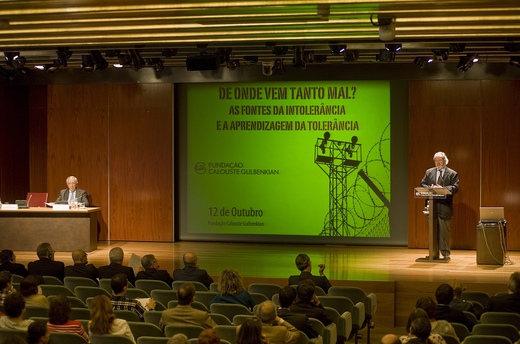Where does so much evil come from?

On October 12th 2015 The Gulbenkian Programme Qualifying the New Generations and the Armenian Communities Department organized a conference on the subject of the sources of intolerance and the learning of tolerance held at the Calouste Gulbenkian Foundation. The conference was directed toward the general public, but it also incorporated parallel sessions designed especially for teachers. Some 200 people attended the event.
During the opening session, the President of the Foundation Artur Santos Silva, underlined that tolerance is at the core of the Calouste Gulbenkian Foundation which looks to the example of the Founder to nurture a multicultural understanding. As the world faces another refugee crisis and growing extremism, it becomes crucial to discuss tolerance and how to teach tolerance in schools.
Dr. José Pacheco Pereira, the conference Commissioner, explained that the aim was to discuss tolerance by debating intolerance. This would be accomplished firstly by analyzing historical, social, economic and cultural factors which foster intolerance, to later reflect on how to become more tolerant. Secondly, by addressing intolerance and teaching tolerance in schools and inviting speakers to provide insight on how to develop practical methods to use in classrooms.
The first session was chaired by Dr. José Pacheco Pereira.
The first keynote speaker, Dr. Joan Rivitz (Teaching Tolerance) used her home town, New Jersey USA, as a case study to provide practical examples on what is being done in schools to foster a more tolerant environment. The central topic of the intervention was the importance of learning from history and applying the lessons of the past to the roots of intolerance, particularly in schools. Dr. Rivitz highlighted the importance of instructing the youth to combat intolerance not only at schools but at home and within communities. Concluding that the teaching of tolerance should aim to go beyond behavioral modification and attempt to change mindsets and foster a more kind and tolerant future generation.
The second keynote speaker, Dr. David Justino (Intolerance in Portuguese Schools) introduced the audience to the limitations of education pointing out that education is not always an infallible source of hope. He stressed how education was, and is used, as an instrument of nationalism and radicalism. Using the example of Portugal, Dr. Justino concluded that more education does not necessarily equal more tolerance. Portuguese schools have been able to successfully integrate foreign students but this achievement derives mostly from cultural factors rather than the development of the school´s curriculum.
Two pararallel sessions under the title Learning Tolerance through Sounds and Films on Intolerance, were especially designed for teachers. The aim of these two sessions was to showcase how the arts relate to intolerance and tolerance. The session with Dr. João Lopes focused on films. He highlighted cinema classics that could be used in classrooms such as Casablanca (1942, Michael Curtis), Dr. StrangeLove (1964, Stanley Kubric) Taxi Driver (1976, Martin Scorsese), Philadelphia (1993, Jonathan Demme), and Entre les Murs/The Class (2008, Laurent Cantet) among others. The session with Dr. Rui Vieira Nery focused on music and how the objectives of national anthems change from period to period.
The afternoon started with Dr. Marc Nichanian (From (Eastern) Dhimmitude to (Western) Tolerance) introducing the topic of how states interact with minorities’ within their borders, tackling the paradox of tolerance versus citizenship. Dr. Nichanian’s presentation centered on the concept of Dhimmitude, a term coined by Bat Ye’or and outlined the links between Dhimmitude and the modern western conception of tolerance. To discuss the concept of Dhimmitude, Dr. Nichanian used as an example the relationship between the Ottoman Empire and the Armenian community within the Empire. He described the system of Dhimmitude as a system of domination where a community is tolerated but also subdued. The attempt to transition from a system of Dhimmitude to the concept of western tolerance led to the violent disintegration of the system of Dhimmitude and the elimination of the Armenians.
Dr. Diogo Pires Aurélio (We are born intolerant? What makes us intolerant?) took on the challenge of directly answering the title of his intervention. Dr. Aurélio compared three different perspectives: the Enlightenment school, the Naturalist/Darwinist school and Sigmund Freud. Dr. Aurélio favored Freud’s answer that the phenomena of war originates biologically in mankind, however, humankind is pacifist due to learned social limitations. This paradox also lead Dr. Aurélio to caution that education should be based on realistic expectations.
Father Anselmo Borges (Sources of intolerance in Judeo-Christian tradition), dedicated his presentation to religion as a whole and not solely focused on the Judeo-Christian tradition. Introducing religion as an experience of the sacred but also a manmade creation which is subject to error, Father Borges, warns that power will always corrupt and lead to extremisms. Father Borges concluded that without solidarity there cannot be peace among humankind, accentuating that beyond religious divisions we are all human and we must work together to reduce the immense suffering in the world.
The closing lecturer was delivered by Dr. José Pacheco Pereira (Europe and its borders: on the present refugee crisis and the identity of Europe –José Pacheco Pereira) who began his intervention by stating that intolerance is a fact of life and tolerance is a social construction. Drawing from his personal experience, Dr. Pacheco Pereira illustrates how communities react to the rise of immigrants by emphasizing that what worries residents is the feeling of unsafety. Regarding the present refugee crisis Dr. Pacheco Pereira stated that European powers are responsible for what is happening in Syria and consequently Europe should receive and integrate refugees. In conclusion, Dr. Pacheco Pereira argued that Europe must work to create the necessary conditions to integrate the flow of refugees ensuring that governments counter the rising feeling of insecurity.
To consult the programme, as well as, some of the speeches delivered by the speakers please click here.
To view the conference please click here.
